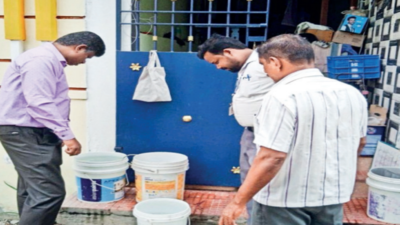Top Searches
- News
- City News
- chennai News
- Chennai: Over 10,000 houses found breeding mosquitoes
Chennai: Over 10,000 houses found breeding mosquitoes

Chennai Corporation officials inspect houses in the city for mosquito breeding
CHENNAI: Want to find if yours is among the 10,052 houses in the city that have been found to facilitate breeding of mosquitoes? Check for stagnant water on all of your premises such as the terrrace, garden, tanks and small pots.
With the northeast monsoon due soon, the city corporation is carrying out door-to-door mosquito breeding inspection every day. Of the 10,74,410 houses inspected in the past few weeks, more than 10,000 were found to have facilitated mosquito breeding. City health officer Dr M Jagadeesan said majority of them were from Tondiarpet and Royapuram areas in North Chennai, and a few central Chennai areas.

For the drive, the civic body has divided the 200 wards in the city into 2,084 smaller divisions and a total of 3,271 workers, including 954 permanent workers and 2,317 contractor workers, have been deployed.
"If the larvae are found in smaller pots or cans, the workers empty it. In bigger drums, we sprinkle larvicide chemicals. We request the residents to check for stagnant water every day," said Jagadeesan. "It is important to check for fresh water stagnation as mosquitoes don't breed in sewage alone."
The corporation may not be so lenient if the mosquito menace booms rapidly. The revised fines for mosquito breeding start from Rs 200, and corporation is empowered to fine up to Rs 10 lakh for facilitating mosquito breeding despite repeated warnings.
Officials said individual residential houses will be let off with a warning for the first time. However, heavy penalties will follow if they are caught for violation in subsequent checks. Businesses establishments such as shops and hotels will be fined for the first time itself.
City corporation commissioner Gagandeep Singh Bedi said such strict measures are being taken well ahead of monsoon as the civic body does not want dengue or malaria to spread. "In fresh water, residents can put salt which would prevent mosquito breeding. In other places, they must keep an eye daily," he said.
With the northeast monsoon due soon, the city corporation is carrying out door-to-door mosquito breeding inspection every day. Of the 10,74,410 houses inspected in the past few weeks, more than 10,000 were found to have facilitated mosquito breeding. City health officer Dr M Jagadeesan said majority of them were from Tondiarpet and Royapuram areas in North Chennai, and a few central Chennai areas.

For the drive, the civic body has divided the 200 wards in the city into 2,084 smaller divisions and a total of 3,271 workers, including 954 permanent workers and 2,317 contractor workers, have been deployed.
"If the larvae are found in smaller pots or cans, the workers empty it. In bigger drums, we sprinkle larvicide chemicals. We request the residents to check for stagnant water every day," said Jagadeesan. "It is important to check for fresh water stagnation as mosquitoes don't breed in sewage alone."
The corporation may not be so lenient if the mosquito menace booms rapidly. The revised fines for mosquito breeding start from Rs 200, and corporation is empowered to fine up to Rs 10 lakh for facilitating mosquito breeding despite repeated warnings.
Officials said individual residential houses will be let off with a warning for the first time. However, heavy penalties will follow if they are caught for violation in subsequent checks. Businesses establishments such as shops and hotels will be fined for the first time itself.
City corporation commissioner Gagandeep Singh Bedi said such strict measures are being taken well ahead of monsoon as the civic body does not want dengue or malaria to spread. "In fresh water, residents can put salt which would prevent mosquito breeding. In other places, they must keep an eye daily," he said.
FOLLOW US ON SOCIAL MEDIA
FacebookTwitterInstagramKOO APPYOUTUBE
Start a Conversation
end of article









